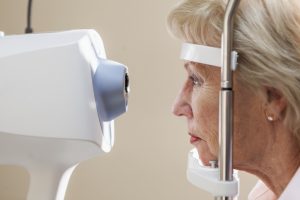Can Cholesterol-Lowering Drugs Prevent Glaucoma?

A recent study published in JAMA Ophthalmology found statins, a type of drug that lowers cholesterol, could help prevent primary open-angle glaucoma, or POAG.
Doctors often prescribe statins to patients with high cholesterol to reduce the risk of a stroke or a heart attack, but statins could have another benefit. A research team from Brigham and Women’s Hospital claims using statins for five years or longer could lower the risk of primary open-angle glaucoma, the most common type of glaucoma.
What is Glaucoma?
Glaucoma is a family of eye diseases in which elevated eye pressure, or intraocular pressure (IOP), causes optic nerve damage and can lead to progressive, permanent vision loss. Since glaucoma often has no symptoms in the early stages, it is very challenging to diagnose. The Brigham and Women’s study suggests statin drugs can lower IOP and enhance blood circulation to the optic nerve, thus preventing POAG.
Jae Hee Kang, Sc.D., an assistant professor of medicine at Brigham and Women’s Hospital, and a team of researchers followed more than 136,000 healthy men and women aged 40 and older. Between 2000 and 2015, the team identified 886 individuals with primary open-angle glaucoma. The results indicated using statins for five years or longer is associated with lowering the risk of POAG by 21 percent, compared to not using statins.
Kang is hopeful about the prospect of broadening the use of statins beyond cardiovascular health. She says statins could also enhance neurological function in the eyes and prevent optic nerve damage. However, the results of the study do not suggest individuals with a family history of glaucoma should take statins to prevent developing POAG. Statins may have negative side effects, especially in older adults.
Practical Ways of Preventing Glaucoma
If you are not taking statins, there are many ways you can prevent glaucoma by making healthy lifestyle choices. According to the Glaucoma Research Foundation, you can:
- Exercise daily — Include daily moderate physical activity in your schedule. Studies show moderate exercise like walking, swimming, biking or yoga can lower your eye pressure. You should try to avoid inverted yoga poses like headstands or downward-facing dog, as these poses may cause spikes in eye pressure.
- Eat a healthy diet — A diet high in fruits, vegetables, whole grains, lean proteins and healthy fats will help nourish your eyes with essential vitamins, minerals and antioxidants. It will also help you maintain a healthy weight.
- Protect your eyes — Eye injuries can cause glaucoma, so wear proper eye protection when you are using power tools, sports equipment or lawn equipment.
- Visit your eye doctor regularly — Glaucoma affects about three million Americans, but only half are aware they have the disease. Yearly comprehensive eye exams are essential for optimum eye health and disease prevention. Call your eye doctor to make appointments for the whole family.
Anyone can develop glaucoma, but some people are at higher risk than others. Take a Glaucoma Risk Assessment to determine your glaucoma risk.
